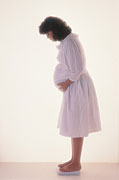- Double Mastectomy May Offer No Survival Benefit to Women With Breast Cancer
- Toxic Lead Found in Cinnamon Product, FDA Says
- Certain Abbott Blood Sugar Monitors May Give Incorrect Readings
- Athletes Can Expect High Ozone, Pollen Counts for Paris Olympics
- Fake Oxycontin Pills Widespread and Potentially Deadly: Report
- Shingles Vaccine Could Lower Dementia Risk
- Your Odds for Accidental Gun Death Rise Greatly in Certain States
- Kids From Poorer Families Less Likely to Survive Cancer
- Tough Workouts Won’t Trigger Cardiac Arrest in Folks With Long QT Syndrome
- At-Home Colon Cancer Test Can Save Lives
More Weight Gain in Pregnancy Tied to Higher Autism Risk for Kids: Study


MONDAY, Oct. 28Modest weight gain during pregnancy might be a sign for autism risk among newborns, new research suggests.
Investigators took pains to stress that it is not weight gain itself that is being tagged as a cause of autism. Nor do the current findings reflect in any way on how pre-pregnancy weight might affect the future offspring of mothers-to-be.
Instead, the study team believes that a small rise in weight occurring while pregnant might be an indication that some broad and complex process — perhaps involving hormone and inflammation irregularities — is underway, of which weight gain is a reflection.
If so, then weight gain during pregnancy might serve as an easily recognizable marker for a constellation of events that collectively increase the risk for autism.
“Although weight gain during pregnancy was associated with autism risk, the modest difference in weight gain found suggests that weight gain serves as a marker rather than a cause for autism,” said study lead author Dr. Deborah Bilder, a pediatrician and assistant professor in the department of psychiatry at the University of Utah, in Salt Lake City.
“As a marker, it would share an underlying cause with autism, such as hormone imbalance or inflammation,” Bilder added.
The study was published online Oct. 28 and in the November print issue of the journal Pediatrics.
The authors said that, unlike in the past, autism is no longer deemed to be a rare disorder, with estimates suggesting that some form of autism affects about one in 88 children in the United States.
Autism spectrum disorders are neurodevelopmental disabilities that can range from mild to more severe. Children with autism display social problems, communication difficulties, and restricted and repetitive patterns of behavior.
For their study, the team focused on two groups of children with autism in Utah.
The first group included 128 children, while the second included 288 children. Maternal weight-gain patterns during pregnancy were analyzed in both groups. The first group’s results were stacked up against those of nearly 11,000 mothers of healthy children of a similar age and gender. The second group’s results were compared against maternal weight gains leading up to the birth of each autistic child’s healthy siblings.
Small increases in weight — in 5-pound increments — while pregnant were linked to a slightly higher but significant risk for autism among the offspring. By contrast, body-mass index (a measurement of body fat based on height and weight) at the start of pregnancy was not associated with a higher risk for autism.
There was an average difference of only about 3 pounds in weight gain when comparing mothers of children with and without autism, the study found.
Bilder reiterated that when it comes to autism risk, weight gain during pregnancy should not be seen as the culprit but rather the canary in the coal mine. She cautioned against any dietary changes based on the findings.
“Good nutrition is essential to a healthy pregnancy,” Bilder said. “Clear guidelines are in place that pregnant women can discuss with their medical providers regarding the recommended weight gain for a healthy pregnancy. This study was not designed to impact these guidelines, but rather to provide future direction to researchers as we investigate possible causes that link risk factors with autism.”
On that score, Dr. Andrew Adesman, chief of developmental and behavioral pediatrics at Cohen Children’s Medical Center of New York, in New Hyde Park, said that, unlike previous research, the current investigation shines light on the risk associated with weight gain during pregnancy, rather than before pregnancy.
“The fact that there is a modestly increased risk of autism in pregnancies associated with extra weight gain provides pregnant women with one more reason to be mindful of their weight gain during pregnancy,” he said.
“Although it is unclear why there is an increased incidence of autism born to mothers who gained more weight during their pregnancy, hopefully [this study] will provide yet another clue to aid researchers in their quest to better understand what causes autism,” Adesman said.
More information
For more on autism, visit the U.S. National Institute of Mental Health.
Source: HealthDay
Copyright © 2024 HealthDay. All rights reserved.










